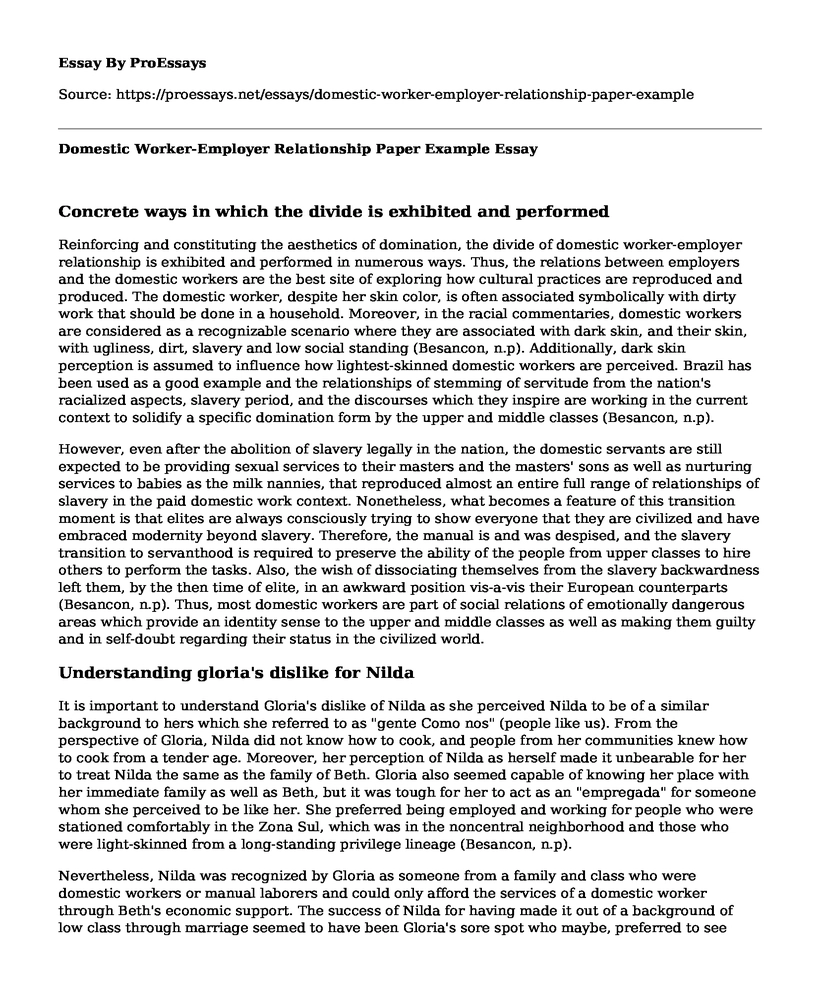Concrete ways in which the divide is exhibited and performed
Reinforcing and constituting the aesthetics of domination, the divide of domestic worker-employer relationship is exhibited and performed in numerous ways. Thus, the relations between employers and the domestic workers are the best site of exploring how cultural practices are reproduced and produced. The domestic worker, despite her skin color, is often associated symbolically with dirty work that should be done in a household. Moreover, in the racial commentaries, domestic workers are considered as a recognizable scenario where they are associated with dark skin, and their skin, with ugliness, dirt, slavery and low social standing (Besancon, n.p). Additionally, dark skin perception is assumed to influence how lightest-skinned domestic workers are perceived. Brazil has been used as a good example and the relationships of stemming of servitude from the nation's racialized aspects, slavery period, and the discourses which they inspire are working in the current context to solidify a specific domination form by the upper and middle classes (Besancon, n.p).
However, even after the abolition of slavery legally in the nation, the domestic servants are still expected to be providing sexual services to their masters and the masters' sons as well as nurturing services to babies as the milk nannies, that reproduced almost an entire full range of relationships of slavery in the paid domestic work context. Nonetheless, what becomes a feature of this transition moment is that elites are always consciously trying to show everyone that they are civilized and have embraced modernity beyond slavery. Therefore, the manual is and was despised, and the slavery transition to servanthood is required to preserve the ability of the people from upper classes to hire others to perform the tasks. Also, the wish of dissociating themselves from the slavery backwardness left them, by the then time of elite, in an awkward position vis-a-vis their European counterparts (Besancon, n.p). Thus, most domestic workers are part of social relations of emotionally dangerous areas which provide an identity sense to the upper and middle classes as well as making them guilty and in self-doubt regarding their status in the civilized world.
Understanding gloria's dislike for Nilda
It is important to understand Gloria's dislike of Nilda as she perceived Nilda to be of a similar background to hers which she referred to as "gente Como nos" (people like us). From the perspective of Gloria, Nilda did not know how to cook, and people from her communities knew how to cook from a tender age. Moreover, her perception of Nilda as herself made it unbearable for her to treat Nilda the same as the family of Beth. Gloria also seemed capable of knowing her place with her immediate family as well as Beth, but it was tough for her to act as an "empregada" for someone whom she perceived to be like her. She preferred being employed and working for people who were stationed comfortably in the Zona Sul, which was in the noncentral neighborhood and those who were light-skinned from a long-standing privilege lineage (Besancon, n.p).
Nevertheless, Nilda was recognized by Gloria as someone from a family and class who were domestic workers or manual laborers and could only afford the services of a domestic worker through Beth's economic support. The success of Nilda for having made it out of a background of low class through marriage seemed to have been Gloria's sore spot who maybe, preferred to see privilege as something which was white or inherent than something that a person like her can get (Besancon, n.p). Therefore, the implicit understanding of Gloria of domestic work class dimension framed Nilda as a person who was not worthy of the embedded deference in the domestic work-employer relationship.
Conclusion
In conclusion, the two articles touch on domestic worker-employer relationship and the effects that they may have on other people. in the first section, the blacks perceived as domestic workers who are dirty and only associate with their employers for monetary purposes as they have no option. Moreover, in the second section, Gloria perceived Nilda as one of her own and therefore, she was unable to treat her the same like the family of Beth. Thus, the two showcase an embedded deference in the domestic work-employer relationship.
Work Cited
Besancon Alain, Etre russe au XIXe siecle. The aesthetics of Domination: Class, Culture, and the Lives of Domestic Workers. Cambridge: Cambridge University Press, 2013.
Cite this page
Domestic Worker-Employer Relationship Paper Example. (2022, Dec 06). Retrieved from https://proessays.net/essays/domestic-worker-employer-relationship-paper-example
If you are the original author of this essay and no longer wish to have it published on the ProEssays website, please click below to request its removal:
- Comparison of Two Management Styles Essay
- Developing a Marketing Plan at BizOps Enterprises Paper Example
- Paper Example on Gender Diversity in Leadership
- Incivility in the Work Place Essay Example
- ISO 14001 and AA1000 Regulations Paper Example
- Essay Example on Job Satisfaction: Attitudes, Behaviors & Feelings that Impact Productivity
- Immigration Officer: A Rewarding Career Path for Students - Essay Sample







